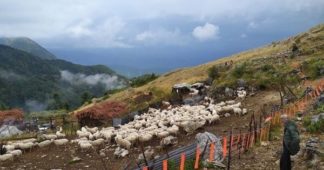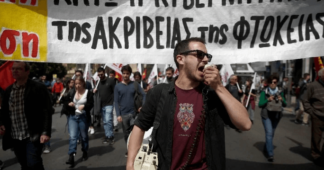Jun 20, 2022
And again: I am back in Greece.
Pregnant teenage mums with empty fridges.
Thin pensioners with skyrocketing electricity bills.
Fishermen who’ve stopped fishing – because boat fuel is too expensive.
Farmers who have stopped farming – because they cannot pay for fertilizers or animal feed.
Single parents no longer able to buy ice cream for their kids.
Young men without work who have stopped visiting the supermarket and queue at soup kitchens.
In the beginning, I thought about going to the Baltic countries. Today’s “champions of eurozone inflation” are located up there: Estonia has inflation of 20 per cent.
But let’s give it a second thought, and: let’s take into consideration that Greece has a long history of traumatic situations: the financial crisis of 2008/9, the recent pandemic that hit tourism and now the war in Ukraine that’s having far-reaching consequences for Greece too, with energy, electricity and raw material prices spiralling up.
Pregnant teenage moms with an empty fridge
Alexandros and Angeliki invite me in. Two-year-old Jason wants to take over my camera. His 19-year-old mum Angeliki is pregnant with her second child.
“Our fridge is always empty,” Angeliki tells me, while Alexandros walks over to show me.
“I don’t have even money to buy diapers,” Alexandros adds.
He has distributed 180 job applications, door by door. But inflation has put stress on the local labour market, nobody wants to hire a hand.
Thin pensioners with skyrocketing electricity bills
Alexandros volunteers at a social kitchen nearby, handing out soup for free for those in need.
Kostas Polychronopoulos / Soup kitchen founder)
Kostas Polychronopoulos, the founder, tells me: “Many pensioners come here, and they bring us their electricity bills, asking for a contribution so that the electricity is not cut off.”
74-year-old Spyros shows up: “A few months ago, my wife could fill up a supermarket caddy without any problem. But due to the war in Ukraine, inflation has accelerated so much, it’s impossible now.”
Usually, the couple pays €40 per month for electricity, now it’s €148. It’s the same problem for Manolis: the pensioner is struggling with an electricity bill for six months of over €1400.
Farmers having stopped farming
A propellor-powered airliner brings me to Naxos. The island depends on tourism – and on agriculture. Fuel for tractors, expensive fertilizer, animal feed imported from Bulgaria. Many Naxos-based farmers are facing ruin. Cattle farmer Stelios Zacharatos, for example.
“In my family, we have had four generations of cattle farmers,” Zacharatos tells me. “I will be the last one.”
Dimitris Kapounis /President, Naxos Farmers’ Cooperative)
The crisis has turned into an existential threat. More than 300 cows and 30,000 goats and sheep have recently been culled.
Out of 1200 Naxos farmers, 150 could have given up by the end of the year if no help comes from Athens or Brussels, the president of the cooperative, Dimitris Kapounis says.
“Costs for pumping water are up from €7 per hour to €30. And fertilizers are up from €300 to €1000 per ton,” he explains
Fishermen have stopped fishing
The situation is no better for fishermen, Stamatis Sergis tells me: “Before, I used to pay €0.40 for ship-diesel and now I am paying €1.50. I can’t even earn €50 per day. So, I keep the boat standing and I work in another job.”
His outlook is grim: “In ten years, there will be no fishermen left.”
The Greek government is working on support programmes: rent increases have been capped, low-income households get a subsidy for fuel and people unable to pay their electricity bills can apply to get up to €600 through a support scheme financed by Greek and European taxpayers’ money.
We remind our readers that publication of articles on our site does not mean that we agree with what is written. Our policy is to publish anything which we consider of interest, so as to assist our readers in forming their opinions. Sometimes we even publish articles with which we totally disagree, since we believe it is important for our readers to be informed on as wide a spectrum of views as possible.











